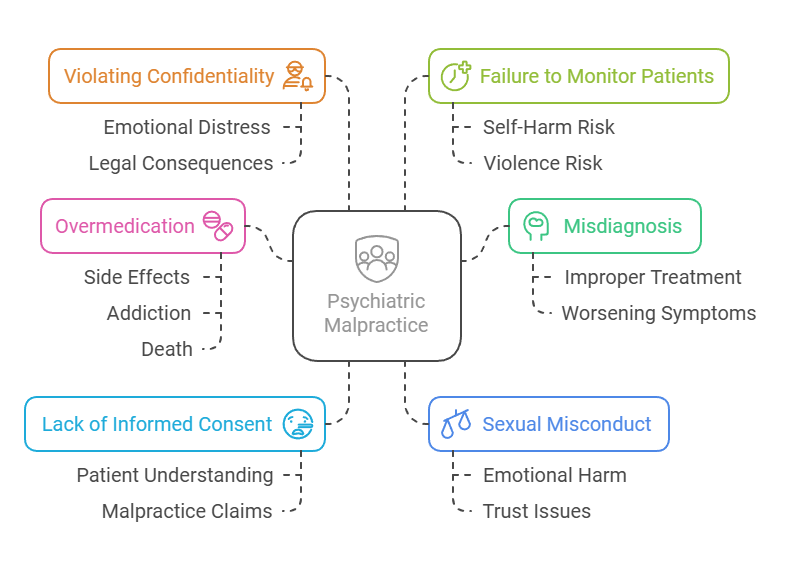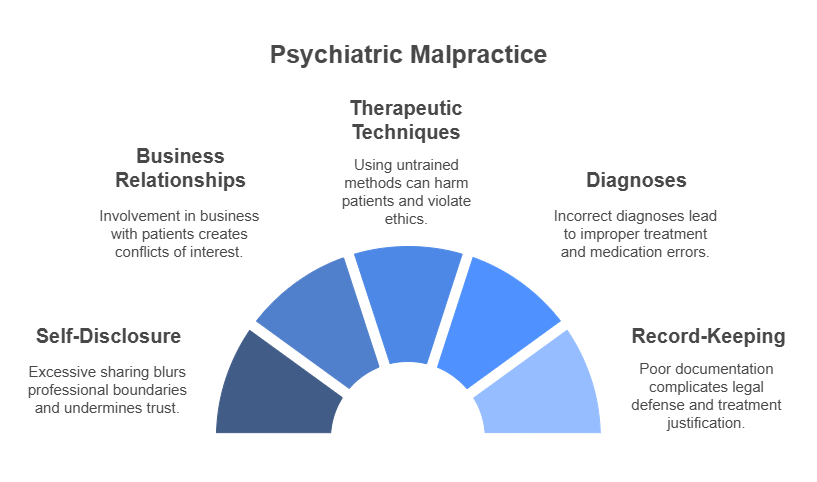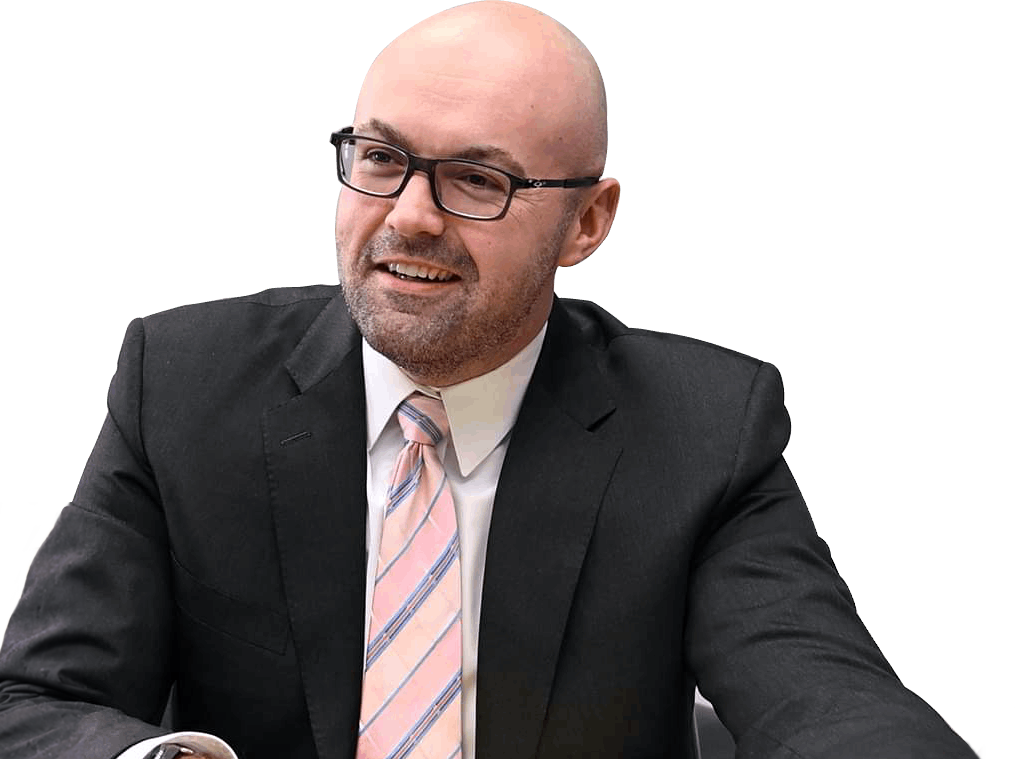Mental health care should heal, not harm. Sadly, psychiatric malpractice can cause trauma, self-harm, or even death. Patients may face misdiagnosis, improper medication, or a lack of care, leaving them worse off. Illinois has specific laws governing psychiatric malpractice cases, and we have a deep understanding of psychiatric negligence lawsuits.
Our Chicago psychiatric malpractice lawyers are here to guide you. Get your free case review today by dialing (312) 261-5656.
Why Choose Our Chicago Psychiatric Malpractice Lawyer?
If you’ve been harmed by psychiatric malpractice, expert legal help is crucial. We understand the challenges of these cases and know how to get results.
- Experience Matters: We specialize in psychiatric malpractice and Illinois law.
- Maximized Compensation: We aim to secure every dollar you deserve.
- Guidance Through the Process: We simplify complex legal steps for you.
Chicago Injury Lawyer has a history of successful malpractice cases. Trust us to fight for your rights and justice.
What Is Psychiatric Malpractice?
Psychiatric malpractice occurs when a mental health professional fails to provide the proper care, resulting in patient harm. Psychiatrists and therapists must diagnose and treat mental health conditions with the highest standard of care. When they fail to do so, it can lead to severe consequences.
Psychiatric Malpractice: Key Examples
Psychiatric malpractice issues are common. Here are some types.
Misdiagnosis: A misdiagnosis occurs when a mental health professional incorrectly identifies a patient’s condition. A wrong diagnosis can lead to improper treatment and worsening symptoms.
Overmedication: Prescribing the wrong medication or too much of it can cause serious harm. It can lead to side effects, addiction, or even death.
Lack of Informed Consent: Psychiatrists must clearly explain treatment options, risks, and alternatives to patients in a manner that is understandable and comprehensible. Failing to ensure patient understanding can lead to malpractice claims.
Sexual Misconduct: Sexual advances or inappropriate behavior by psychiatrists violates professional ethics and harms patients emotionally. This form of malpractice destroys trust and worsens mental health conditions.
Violating Confidentiality: Sharing sensitive patient Information without consent breaches trust and privacy. Confidentiality is a cornerstone of psychiatric care, and its violation can result in emotional distress and legal consequences.
Failure to Monitor Patients: Psychiatrists must regularly monitor patients, especially those at risk of self-harm or violence. Neglecting this responsibility can lead to tragic consequences.
The Act (735 ILCS 5/2-622) states that the victim’s family has 2 years to file a medical malpractice claim for the injury or death that occurs. If the injury is not discovered within this period, the claimant has up to 4 years from the incident to file. Our Chicago misdiagnosis attorney, medication errors lawyers, violation of patient consent lawyer, and Chicago nursing home sexual abuse lawyer have handled many cases of psychiatric malpractice. Through a free consultation, you can receive guidance for your case.

How Psychiatric Negligence Affects Patients’ Lives
Psychiatric malpractice can cause emotional, physical, and financial harm.
- Emotionally, the patient may experience worsened mental health, distress, or trauma.
- Physically, improper medication or treatment may cause side effects, including organ damage or other health problems.
- Financially, patients may suffer due to medical bills, lost wages, and the costs associated with seeking new treatment.
Psychiatric malpractice can have long-lasting effects, even death. According to the Illinois Wrongful Death Act (740 ILCS 180/2), family members of the deceased victim must file a claim within two years of death.
Compensation will be given for funeral expenses, loss of financial support, companionship, and emotional suffering. Let our experienced Chicago psychiatric malpractice attorneys help you move forward with confidence.
Most Common Complaints Against Psychiatrists in Malpractice Cases
Psychiatric malpractice often arises from critical failures in diagnosis or treatment.
Other common complaints against psychiatrists and therapists in malpractice cases include:
Excessive or Inappropriate Self-Disclosure
Therapists must maintain professional boundaries. Sharing too much personal Information blurs the therapeutic relationship, leaving patients feeling uneasy or neglected.
Involvement in Business Relationships with Patients
Entering business arrangements with patients undermines trust and objectivity. These conflicts of interest compromise the therapeutic dynamic and lead to unethical practices.
Using Unfamiliar Therapeutic Techniques
Therapists should only use methods for which they are trained and certified. Employing experimental techniques without proper knowledge can harm instead of providing help.
Assigning Incorrect Diagnoses
Some psychiatrists may assign inaccurate diagnoses due to negligence or questionable motives. This misleads other healthcare providers, leading to improper treatment and medication errors.
Avoiding Evidence-Based Models
Some therapists use unproven methods, opting for alternative treatments rather than accepted ones. This risks harm, especially for patients needing medication or medical care.
Poor Record-Keeping
Accurate and detailed documentation is essential in psychiatry. Inadequate records complicate legal defense and treatment justification.
Failing to Take a Complete Patient History
A thorough patient history is critical for accurate diagnosis and treatment. Neglecting to gather medical, family, or treatment history can overlook crucial care details.
Proving causation is often the most challenging part. Our medical malpractice lawyer and failure to treat attorney will champion your cause against those who caused harm. Talk to us for free legal guidance.

Proving Liability in Psychiatric Malpractice Cases
Proving liability in psychiatric malpractice cases requires thorough evidence and legal expertise. You must demonstrate that the psychiatrist’s negligence caused harm. This process involves meeting specific legal standards and gathering compelling evidence.
Legal Requirements for Proving Negligence
Proving negligence requires showing the psychiatrist breached their professional standard of care. Their actions fell below what a competent psychiatrist would do in similar circumstances. Negligence must directly lead to the harm suffered by the patient.
Role of Expert Witnesses
Expert witnesses play a critical role in these cases. They explain the standard of care and how the psychiatrist’s actions deviated from it. Their testimony helps establish whether negligence occurred and its impact on the patient.
Gathering Medical Records and Evidence
Comprehensive evidence is essential for a strong case. Medical records, therapy notes, and other documentation are needed. This Information is critical in showing where the psychiatrist may have failed.
Our professional psychiatric malpractice attorneys understand the complexities of the case. Claim your free consultation and start fighting for your rights.
Maximizing Your Psychiatric Malpractice Claim
If you’ve suffered due to psychiatric malpractice, you may be entitled to significant compensation. These damages aim to address the full extent of your financial and emotional losses.
Economic Damages: Refund for tangible losses like medical expenses, therapy costs, and lost wages.
Non-Economic Damages: Compensation for pain, suffering, and emotional distress caused by negligence.
Punitive Damages: Reserved for cases of extreme negligence to penalize wrongdoing and prevent future harm.
How Long Do You Have to File a Claim in Chicago?
The statute of limitations for most medical malpractice cases is two years from the date of the incident. This means patients usually have two years to file a lawsuit. However, this timeline can be complex, depending on the circumstances.
To protect your rights, you must take action right away. If you wait too long, you may lose the opportunity to seek compensation.
How Much Does It Cost to Hire a Psychiatric Malpractice Lawyer in Chicago?
If you or a loved one has suffered due to negligent psychiatric care—such as misdiagnosis, overmedication, or failure to prevent self-harm—you may be entitled to compensation. Hiring a qualified psychiatric malpractice lawyer in Chicago typically comes with no upfront costs. Most firms take these sensitive and complex cases on a contingency fee basis, meaning you only pay if your attorney secures a settlement or court award.
Psychiatric Malpractice Cost Calculator [?]
Estimate Breakdown
Disclaimer: Estimates are non-binding and may vary based on actual legal engagement and case specifics.
Steps to Take If You Suspect Psychiatric Malpractice
If you believe you’ve been a victim of psychiatric malpractice, don’t delay. The proper steps can help protect your health and strengthen your compensation case.
- Get immediate help from another healthcare provider to address any harm caused by psychiatric malpractice.
- Keep records of your treatment, communications, and any incidents of negligence.
- Reach out to an experienced Chicago psychiatric malpractice attorney to evaluate your case and guide you through the legal process.
Contact Us For A FREE Consultation
If you or a loved one has been affected by psychiatric malpractice, we are here to help. Schedule a free consultation with the Chicago Personal Injury Lawyer team to discuss your case and legal options. Our psychiatric malpractice lawyer provides compassionate and confidential support every step of the way. Call us now at (312) 261-5656 or email us.
Frequently Asked Questions
How long does the legal process take?
The duration varies depending on the complexity of the case. On average, it may take several months to years, especially if the case goes to trial.
Can a hospital or clinic also be held liable?
Yes, if a hospital or clinic employs a psychiatrist, the institution may also be held liable for malpractice. The healthcare facility can be responsible for the actions of its staff.
Can I file a psychiatric malpractice lawsuit for emotional distress?
Yes, emotional distress can be considered in a malpractice case. This is especially true when the psychiatrist’s actions worsen the patient’s mental health or cause emotional harm.
Can I sue a psychiatrist for overmedication or inappropriate medication?
Yes, if a psychiatrist prescribes the wrong medication or mismanages dosages, it can lead to a malpractice claim. Failing to monitor medication use properly can also result in a malpractice case.



